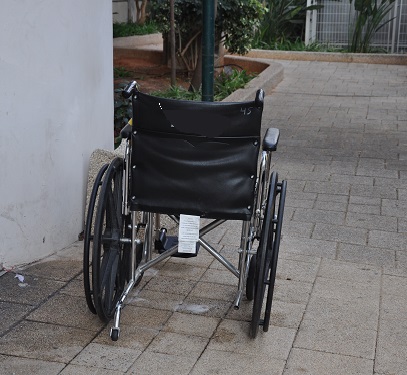The general disability stipend is designed to give minimal help to the disabled who are not entitled to a stipend from any other source.
Types of injuries for which one can try to claim a general disability stipend from National Insurance
“The General Disability” Law relates to disabled people who are not included in any of the other existing laws relating to the disabled. Every disabled person who is not covered by insurance by virtue of any existing law which handles a defined group of disabled people, can claim for recognition by virtue of the General Disability Law. This is for those with a genetic disability since birth, by illness, by an incidental accident (fall), or by an act of wrongdoing.
Disabled individuals as a result of injury during military service, a work accident, terrorist activity – receive allowances, rehabilitation services, treatment and so forth by virtue of other laws.
What is the aim of the National Insurance general disability stipend?
The aim of the disability stipend is to compensate the disabled individual for the loss of his ability to make a living and not due to the very existence of the disability. Therefore, in order to receive a general disability stipend from National Insurance (Bituach Leumi) one must comply with two accumulative conditions:
- The minimum medical disability percentage as determined (details hereinafter).
- Loss or decrease in ability to make a living (details hereinafter).
Who is “disabled” pursuant to the National Insurance General Disability Law?
- Age: a resident of Israel who is 18 years and over and has still not reached retirement age.
- Medical disability percentages: a physician on behalf of National |Insurance has determined for you medical disability at a rate of 60% at least, or at a rate of 40% at least, if you have several medical disabilities and for a certain disability you have been determined medical disability of 25% at least. Medical disability is not calculated by adding the disabilities together but rather by adjusted calculation of the various disability percentages.
- Functional ability: determined when due to a person’s disability he is unable to work or his ability to make a living has decreased by 50% at least, and he has been determined as a Level A fitness in one of these percentages: 60%, 65%, 71% or 100%.
- Financial criterion: an individual who does not work or whose income as a salaried employee or as a self employed individual is less than 60% of the average wage, NIS 6,331 (starting from 01.01.2020).
- A married woman who has not worked for a long period, shall be examined on a different track for the purpose of receipt of a disability stipend for a housewife. The examination on the housewife track will be carried out if the woman has not worked for 12 consecutive months or 24 non-consecutive months, in the 48 months that preceded the date of filing the claim, or that preceded the date on which she stopped working –if she stopped working after filing the claim.
What are the percentages of the disability stipend?
The total percentage of the stipend is determined pursuant to an inability to work scale (fully or partially).
A full scale (100% or 75%); partial scale at 75%; partial scale 65%; partial scale 60%
Supplement for children
The supplement paid for children answering one of the following conditions:
- They have still not reached the age of 18.
- They are serving in the army or national service, and have still not reached the age of 24.
- They answer the definition of a child pursuant to the Old Age Pension Law.
The supplement for children is paid only for the first two children.
Supplement for spouse
The supplement is paid for a spouse who answers the following two conditions:
- The total income of the spouse is up to Nis 5,856 (as of January 2020)
- The spouse does not receive any other stipend.
The process of handling the claim
First stage: the claims officer in the National Insurance branch checks the claim.
Second stage: the National Insurance physician checks the claim.
Third stage: examination by the medical committee.
Fourth stage: decision in regard to the claim.
Who determines the disability and the disability percentages?
The National Insurance medical committee determines whether an individual is entitled to disability percentages and if so what the percentage is. The disability is determined by the physician pursuant to the National Insurance Institute Law and its regulations. If the applicant has complied with the conditions of the percentage of the suitable medical disability, he will be transferred for examination of the second condition which is lack of ability to make a living (he is not able to make a living or his ability to make a living has decreased by 50% or more). This determination will be made by a special committee for this purpose. That is to say, for one for whom it has been determined that he has not lost his ability to work, he will not receive a disability stipend even if his medical disability is high.
“Fast track” for those with serious disabilities
People with serious disabilities can file a claim within the framework of the fast track and National Insurance will try to finish the handling of the claim within 30 days from the date of filing the claim.
Filing an appeal as to the decision of the medical committee regarding the percentage of the disability
An individual whose application for a general disability stipend has been rejected due to a disability percentage that is lower than that required by law, or for one who has been determined a disability percentage which awards him with a general disability stipend however he wishes to increase the percentage of the disability (and accordingly to increase the sum of the stipend) can file an appeal to the appeals committee.
Transition from a disability stipend to an old age pension
Recipients of general disability stipends, who have reached retirement age, shall not be entitled to a disability stipend and shall start to receive an old age pension only.
Recipients of a general disability stipend proximate to the time that they became entitled to an old age pension, their old age pension shall be no less than the percentage of the last monthly disability stipend that was paid to them, and it will be updated by the percentages and on the dates on which the general disability stipend is updated.
The information presented in the English website is partial. For full info please visit our Hebrew website
(image is for demonstration purposes unsplash)

 donation
donation 




“Reuth Information Center”, All rights reserved to Reuth rehabilitation hospital. Reuth Information Center is an informational site only. All information on the Website is not a replacement or a substitute for medical, legal, economic, consumer, financial or other advice and any use of the information on the Website is solely the responsibility of the User. Surfing is subject to Terms of Use.